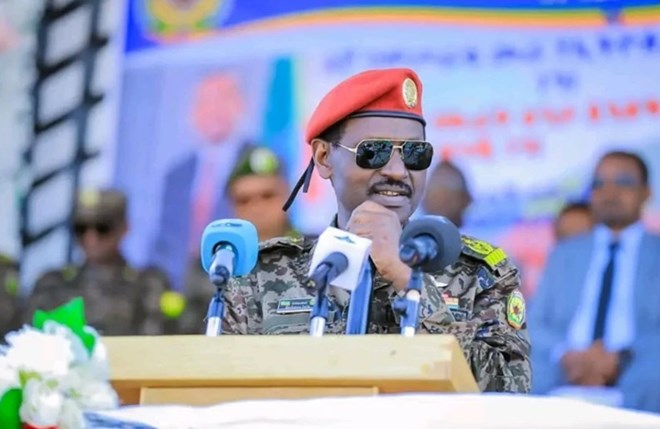Ethiopian Military Chief’s Comments Ignite ONLF Controversy
ONLF Demands Retraction of Ethiopian General’s Allegations: Impact on Peace Process
How Ethiopian-Egypt Tensions Impact ONLF’s Political Legitimacy
Mogadishu—The Ogaden National Liberation Front (ONLF) is pressing the Ethiopian government for immediate clarification and a retraction of statements allegedly made by General Berhanu Jula, Chief of Staff of the Ethiopian National Defense Forces. General Jula reportedly tagged the ONLF as an “enemy” of Ethiopia, insinuating that Egypt orchestrated its creation. The ONLF has branded these remarks as false, inflammatory, and a direct affront to the peace agreement brokered between the group and the Ethiopian authorities.
- Advertisement -
ONLF spokesperson Abdulqadir Hassan Hirmoge (Adani) spoke to the BBC, voicing astonishment at the statements. He emphasized their unacceptability.
“These statements blindsided us. To imply that we are aiding Ethiopian opposition forces is a clear provocation,” he remarked.
In a statement released on Wednesday, the ONLF declared that these accusations jeopardize its reliability as a recognized political party. They questioned the Ethiopian government’s dedication to the peace process, urging authorities to publicly disavow the General’s comments or elucidate their intentions. The ONLF cautioned that failing to do so could destabilize the conciliation efforts that have been in motion since 2018.
According to the ONLF, the statements were broadcast on Ethio-Forum on September 8, 2024, and quickly disseminated on YouTube. General Jula allegedly claimed that Egypt has a history of backing rebel factions like the ONLF to undermine Ethiopia. The ONLF demanded immediate clarification, considering the allegations a “blatant attack” on its legal status and commitment to peace.
The group warned that inaction from the Ethiopian government would signify a violation of the 2018 peace agreement between the two sides. The ONLF leadership highlighted their consistent adherence to the agreement, which terminated hostilities and legitimized the ONLF as a political party in Ethiopia’s Somali region.
“Six years ago, we committed to a peace agreement. Since then, we’ve followed a peaceful struggle. Our region has become one of the steadiest, benefiting our people through peaceful means. The ONLF’s political stance has always been rooted in peace,” Adani affirmed.

The ONLF cautioned, “If the Ethiopian government does not promptly address this, it could mean they no longer recognize the ONLF as a legitimate party but as an adversary.” This could critically impact both the peace process and the security of involved parties.
In their statement, the ONLF reiterated its founding principles – fighting for the self-determination of the Somali people in Ethiopia’s Ogaden region. They referenced the 2018 peace agreement brokered in Asmara, Eritrea, which ended decades of conflict and established a path for peaceful political engagement. However, ONLF underscored that several core issues remain unresolved, such as reparations for past grievances and acknowledgment of historical injustices against the Somali people.
While recognizing some progress, particularly the cessation of hostilities, the ONLF criticized the Ethiopian government for not fully implementing the peace deal. They estimated that only a fraction—about 20 percent—of the promised actions under the accord had been realized, leaving major concerns unaddressed.
Despite this squabble, the ONLF reaffirmed its commitment to peace and to advocating for Somali rights through non-violent means, stressing that it would not tolerate actions or statements jeopardizing its legal status or the peace foundational trust.
“We call on the Ethiopian government to swiftly clarify their position. Silence or inaction will compel us to reconsider our approach and future actions,” the group warned.
In parallel, elders from Ethiopia’s Somali regional state, led by Gerad Kulmiye Gerad Mohammed, have implored Somalis to “steer clear of conflicts unrelated to them” amidst rising tensions in the Horn of Africa. During a regional discussion, the elders stressed stability and cautioned that Ethiopia’s quest for sea access is for shared prosperity. Gerad warned that destabilizing Ethiopia would likewise harm the Somali region.
The elders also voiced concerns over external interferences in the region, specifically highlighting reports of Egypt supplying military gear to Somalia, heightening fears of strife concerning the “Nile issue.” They urged Somalis to oppose foreign influences, especially those not actively combating threats like al-Shabaab.
